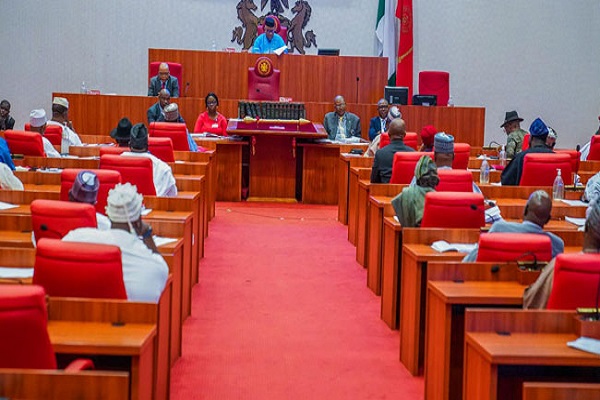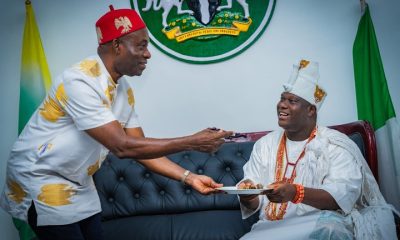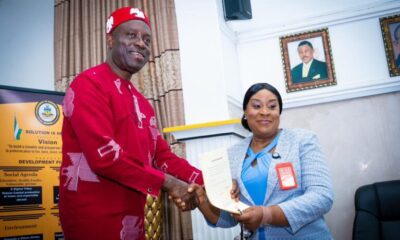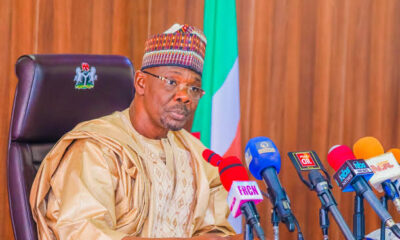News
NUJ, Anambra Govt. bicker over alleged shut down of newspaper

The Nigeria Union of Journalists (NUJ) has criticised Gov. Chukwuma Soludo- led administration in Anambra for allegedly shutting down the state-owned National Light newspaper.
The Chairman, NUJ Anambra Council, Dr Emeka Odogwu, told the News Agency of Nigeria (NAN) on Sunday in Enugu that the latest move by the government remained “an open ill-treatment“ of journalists by the Soludo administration.
He said the latest move also portrayed the state government as one without a human face.
“We frown at the reckless manner in which the National Light newspaper issue is being handled and we urge that the staff be absorbed in the Ministry of Information as anything to the contrary would boomerang.
“The NUJ cannot understand why Soludo’s government was busy employing other workers but cannot allow fewer than 100 workers at National Light newspaper be, even if he does not want to hire more workers or turn around the organisation.
“We are calling on journalists across Nigeria and the world to stand up against the injustice being meted to workers at National Light newspaper who have committed no offence,” he said.
Odogwu said that he reliably gathered that the purported letter closing down the newspaper had been handed to a top management official of the organization on July 20.
Responding, Chief Paul Nwosu, the Commissioner for Information and Public Enlightenment, said there was no directive shutting down the newspaper house.
“I am not aware of what he is saying. What you are saying is new to me.
“If government wants to shut down such an establishment, there will be an official public statement to that effect.
“As at the last Executive Council meeting of the state, we did not discuss any issue concerning the National Light newspaper,” Nwosu said.
Headline
Prince Harry visits sick Nigerian soldiers in Kaduna

Prince Harry and his team visited the 44 Nigerian Army Reference Hospital in Kaduna to interact with wounded soldiers who are receiving treatment.
The Duke of Sussex is in Nigeria with his wife to champion the Invictus Games, which Harry founded to aid the rehabilitation of wounded and sick servicemembers and veterans.
Nigeria joined the Invictus Community of Nations in 2022 becoming the first African country to join.
Prince Harry’s visit to Kaduna came 68 years after his late grandmother Queen Elizabeth II visited the state during the time of the late Premier of Northern Region Sir Ahmadu Bello.




News
Senate approves death penalty for drug traffickers

Senate on Thursday, May 9, approved the death penalty for those convicted on the charge of drug trafficking in the country.
The punishment prescribed in the extant NDLEA Act is a maximum sentence of life imprisonment.
The resolution of the Senate followed its consideration of a report of the Committees on Judiciary, Human Rights and Legal Matters and Drugs and Narcotics, National Drug Law Enforcement Agency (NDLEA) Act (Amendment) Bill, 2024.
The Chairman of the Committee on Judiciary, Human Rights & Legal Matters presented the report during plenary, Senator Mohammed Monguno (APC-Borno North).
The bill, which passed its third reading, aims to update the list of dangerous drugs, strengthen the operations of the NDLEA, review penalties, and empower the establishment of laboratories.
Section 11 of the current act prescribes that “any person who, without lawful authority; imports, manufactures, produces, processes, plants or grows the drugs popularly known as cocaine, LSD, heroin or any other similar drugs shall be guilty of an offence and liable on conviction to be sentenced to imprisonment for life” was amended to reflect a stiffer penalty of death.
Although the report did not recommend a death penalty for the offence, during consideration, Senator Ali Ndume moved that the life sentence should be upgraded to the death penalty.
During a clause-by-clause consideration of the Bill, Deputy Senate President Barau Jibrin, who presided over the session, put the amendment on the death penalty to a voice vote and ruled that the “ayes” had it.
But Senator Adams Oshiomhole objected to the ruling, saying that the “nays” had it.
He argued that matters of life and death should not be treated hurriedly, but Barau said it was too late, as he failed to call for division immediately after his ruling.
The bill was subsequently read for the third time and passed by the Senate.
-

 Headline2 days ago
Headline2 days agoSuspend cybersecurity levy– Reps to CBN
-

 Headline2 days ago
Headline2 days agoTinubu resumes work after foreign trip
-

 Business2 days ago
Business2 days agoNigeria needs over $2bn to revive Ajaokuta Steel Plant, says Minister
-

 News2 days ago
News2 days agoShan George’s money returned to Zenith Bank account
-

 Entertainment3 hours ago
Entertainment3 hours agoAMVCA Cultural Day: BBNaija’s Neo, Venita win Best Dressed Male, Female
-

 Metro3 hours ago
Metro3 hours agoEx-Sports Minister laments after hospital neglected him for hours over N80000 deposit
-

 Headline3 hours ago
Headline3 hours agoPrince Harry visits sick Nigerian soldiers in Kaduna















